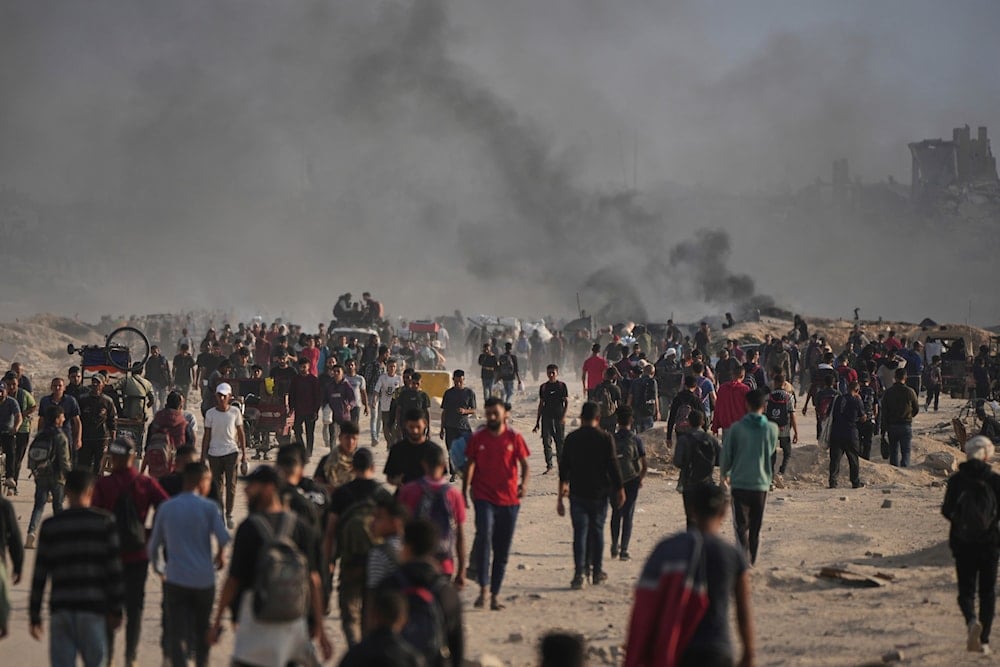Global displacement crisis worsens as Gaza genocide fuels mass exodus
Despite a record 122 million people displaced globally, the UN warns that a sharp decline in funding is worsening conditions for civilians fleeing conflicts in Gaza, Sudan, and other crisis zones.
-

Forcibly displaced Palestinians move along the shore of Gaza City on June 9, 2025. (AP)
The number of people forcibly displaced worldwide has surged past 122 million, according to the latest report from the United Nations High Commissioner for Refugees (UNHCR), marking an alarming new peak in the global displacement crisis. The rise is fueled by prolonged wars and dwindling humanitarian funding, with Palestinians in Gaza among the most affected amid the ongoing genocide carried out by the Israeli occupation.
While the fall of Bashar al-Assad’s government in Syria led to the return of some displaced Syrians, overall displacement increased by more than 2 million by the end of April 2025 compared to the previous year, the report stated.
Moreover, the situation in Gaza, where hundreds of thousands have been forced to flee repeated bombings and a systematic siege, was not explicitly quantified in the report but remains one of the gravest humanitarian emergencies in recent memory.
In a statement, UNHCR chief Filippo Grandi said: "We are living in a time of intense volatility in international relations, with modern warfare creating a fragile, harrowing landscape marked by acute human suffering."
Humanitarian aid drops to decade-low as Gaza civilians face catastrophe
According to the UNHCR, displacement is rising fastest in areas marked by ongoing or escalating armed wars, namely Sudan, Myanmar, Ukraine, and Palestine. In Gaza, repeated forced evacuations ordered by the Israeli occupation, coupled with widespread bombing of hospitals, schools, and refugee camps, have led to mass internal displacement and the collapse of civil infrastructure.
The agency noted that the continued failure to halt Israeli assaults remains a primary driver of new displacements. In Sudan, civil war has left millions without shelter; in Myanmar, military crackdowns persist; in Ukraine, the war continues to displace civilians.
Despite skyrocketing needs, humanitarian aid levels have fallen back to 2015 figures, even as the number of displaced people worldwide has more than doubled. The UNHCR described the situation as "brutal and ongoing," noting that many civilians, especially in Gaza, are left in conditions that verge on famine.
In recent months, "Israel" has denied or delayed hundreds of aid delivery requests to northern Gaza, including convoys containing water, food, and fuel. That said, humanitarian organizations have repeatedly warned that the Israeli blockade, combined with international funding cuts, is pushing Gaza’s population toward collapse.
The agency also pointed to a severe funding shortfall resulting from the United States, under President Donald Trump, slashing most foreign aid allocations. The UK and several European countries have followed suit, redirecting public funds from aid toward military and defense expenditures.
UNHCR: Gaza epitomizes the cost of political inaction
UNHCR warned that a stark lack of political will is perpetuating the global displacement crisis to resolve the root wars. Nowhere is this more evident than in Gaza, where millions have been forcibly displaced under conditions that many international observers and human rights groups have termed genocidal.
While the agency stopped short of naming all states responsible, it warned that cuts to refugee services are placing lives at risk, particularly exposing women to sexual violence and children to trafficking. For Palestinians, especially those trapped in temporary shelters or forced into mass displacement corridors, the consequences are even more devastating.
As Grandi noted, global systems are failing those most in need: "When aid disappears and war continues, civilians pay the highest price."
Read more: 'Brutal funding cuts' for aid threaten millions of lives: UN

 4 Min Read
4 Min Read










